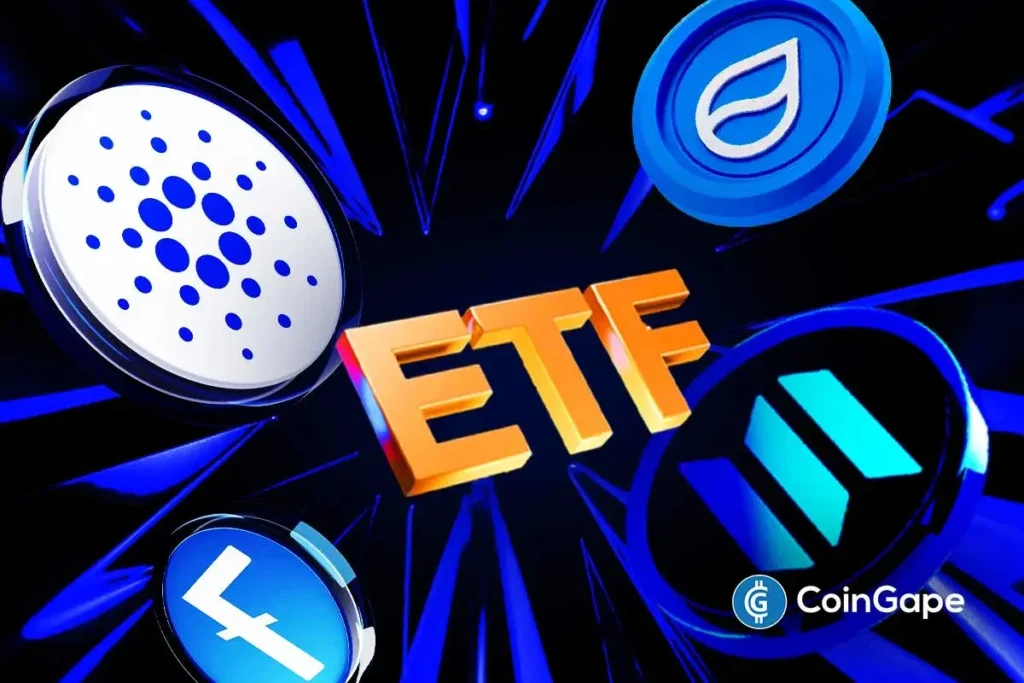Institutional Investors Lose Interest in Altcoins Amid ETF Delays
The crypto market is experiencing significant turbulence, particularly in the altcoin segment, with institutional investors pulling back their support. As delays concerning the U.S. Securities and Exchange Commission (SEC) decisions on multiple exchange-traded funds (ETFs) become prolonged due to the ongoing U.S. government shutdown, altcoins like Solana, Cardano, Litecoin, and Sui are feeling the brunt of this shift in investor sentiment.
Shift in Institutional Focus: Solana, Cardano, Litecoin, Sui
Recent reports have indicated a marked cooling of capital flows into prominent altcoins, notably Solana and XRP. According to a report by CoinShares on October 27, Solana experienced inflows of $29.4 million, while XRP saw inflows of $84.3 million. These numbers, while still positive, are significantly lower than the substantial inflows witnessed earlier this month. For instance, in early October, Solana recorded inflows of $706.5 million, and XRP followed suit with $219.4 million. This decline can be attributed to investor apprehension regarding the SEC’s unfinished business in weighing ETF proposals amidst a government shutdown that shows no signs of resolving soon.
Institutional interest has shown sharp reversals not only in Solana and XRP but also in Cardano and Sui. Cardano, which had previously seen inflows of $3.7 million, is now reporting a mere $0.3 million outflow. Meanwhile, Sui has witnessed a larger outflow of $8.5 million compared to its prior inflows of $5.9 million. Other altcoins such as Chainlink and Litecoin are similarly experiencing dwindling capital inflows, underscoring a broader shift away from altcoin investments during this uncertain period.
The Broader Crypto Market Landscape
Despite the downturn in altcoins, the overall crypto funds market is still displaying resilience with remarkable inflows of $921 million, primarily driven by improving investor confidence following recently released lower-than-expected U.S. Consumer Price Index (CPI) data. Key markets, particularly the U.S. and Germany, are contributing positively to the rise in Total Assets Under Management (AuM), which has now reached approximately $229.65 billion, coupled with a robust trading volume of $39 billion.
Bitcoin remains a focal point as it has attracted the bulk of the inflows, totaling $931 million. This represents a significant increase, bringing cumulative inflows since the Federal Reserve’s rate cuts to a substantial $9.4 billion. Despite the current volatility surrounding upcoming monetary policy adjustments, Bitcoin’s price resilience has resulted in it rebounding past the $116,000 mark amid rising optimism concerning future trade deals, particularly between the U.S. and China.
Ethereum’s Recent Challenges
On the flip side, Ethereum, the second-largest cryptocurrency by market capitalization, is facing its first outflow in five weeks, amounting to $169 million. This marks a notable departure from its stable flow of investments, especially in light of the recent rebound in the crypto market. Despite ETH’s price surging above $4,200, major holders, or "whales," appear to be booking profits in anticipation of potential market instability ahead.
This trend of outflows for spot Ethereum ETFs in the U.S. has persisted for three consecutive days. Such a situation underscores the mixed sentiments among institutional investors regarding future performances, particularly in light of prospective volatility in the broader market dynamics.
Implications of the SEC Delay
The delay in SEC decisions regarding several crypto ETFs is creating an uncertain environment for institutional investors. The stakes are particularly high given the importance of these ETF launches for the altcoin market. An ETF approval would typically provide heightened legitimacy and accessibility for cryptocurrencies, which in turn could stimulate significant capital inflows. The continuing government shutdown, however, hampers any such developments, leading to a cautious stance among institutions.
Without definite timelines for the SEC’s decisions, investors are likely to remain hesitant in committing significant resources to altcoins. As a result, the prevailing narrative suggests that institutional investors are pivoting towards more established assets, particularly Bitcoin and possibly Ethereum, while reallocating funds away from riskier altcoin ventures during this turbulent period.
Looking Ahead: Opportunities and Risks
As the crypto landscape continues to evolve, the current state of the market presents both opportunities and risks for investors. While the sharp decline in inflows for altcoins like Solana and Cardano may be concerning, the resilience shown by Bitcoin indicates that there remains strong institutional confidence in major cryptocurrencies. The impending decisions from the SEC could significantly influence market dynamics and alter the trajectory for altcoin investments.
Moreover, as economic indicators, such as the CPI, hint at broader systemic changes and with market volatility expected in the wake of potential interest rate adjustments, investors are advised to remain vigilant. They must assess the market’s trajectory carefully while weighing the risks associated with altcoin investments during a challenging landscape.
In conclusion, while institutional confidence in altcoins has waned due to ETF delays and broader market uncertainties, the overall crypto market retains significant potential for growth, highlighted by impressive inflow metrics for Bitcoin. The outlook remains delicate, but strategic investments in established cryptocurrencies may offer a hedge against ongoing market volatility. The resolution of the SEC’s ETF discussions may pave the way for renewed interest in altcoins, thereby rebalancing the overall narrative in the crypto investment arena.


